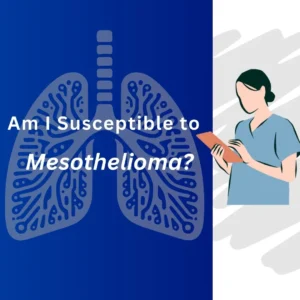Date: July 19th, 2024
Reviewed and edited by Dave Halpern
Key takeaways: The biggest risk for developing mesothelioma is asbestos exposure, although there are rare instances of non-asbestos mesothelioma cases. You can gauge your susceptibility for developing mesothelioma by auditing any asbestos exposures you may have had. If you’ve been exposed to asbestos, be sure to tell your doctor immediately.
How is asbestos related to mesothelioma?
The main risk factor that’s causally related to mesothelioma—meaning that there’s an indisputable link—is asbestos exposure. Asbestos has been a known carcinogen since the 1970s, but minimal legislation has passed—until very recently—that protected Americans against this public health risk. Suffering an asbestos exposure, especially if it was repeated, occupationally related, or related to military service, puts you at risk. Despite these “heightened” risk factors, any exposure to asbestos puts you at risk for developing mesothelioma.

Although scientists have struggled to identify one pathway of carcinogenesis—or cancer development—due to asbestos exposure, there have been several theories that are likely concurrently true. Some of the theories directly intersect with the susceptibility of people to mesothelioma, like:
- Some people that are exposed to asbestos won’t develop mesothelioma or asbestosis. This could be due to epigenetic differences—proteins that control whether or not genes are expressed—that are either inherited or changed as a result of environmental pressures.
- The BAP1 genetic mutation, which is either inherited (germline) or directly caused by asbestos, has been associated with higher instances of mesothelioma.
- A weakened or impaired immune response prior to asbestos exposure could affect how one reacts to asbestos. Again, not all people exposed will develop mesothelioma. This could be because of varying immune responses or the individual’s ability to regulate the inflammatory response as incited by ingested asbestos.
- The overall fitness of people that have been exposed could contribute to their likelihood for developing mesothelioma. This can be quantified by physical activity levels, diet, and preexisting conditions (like other cancers or chronic, but not fatal, diseases).
The best way to gauge whether you might be susceptible to developing mesothelioma is determining whether you’ve been exposed to asbestos. If you’ve been exposed to asbestos, there’s a likelihood of developing an asbestos-related disease, like asbestosis or mesothelioma. Despite knowing that exposure is directly related to these diseases, there isn’t a way to necessarily “screen” for either the likelihood of developing the disease or whether or not you’re guaranteed to develop the disease. Usually, clinicians recommend a yearly X-Ray or CT scan, which can visualize scar tissue, fluid buildup, or tumors, but these are only proxies for mesothelioma. A diagnosis isn’t credible without a biopsy, or a sample of living tissue. Importantly, there isn’t a proactive approach for protecting people who have been exposed to asbestos, which makes asbestos an even more urgent issue.
Are there other risk factors for developing mesothelioma?
There are a few documented cases of patients being diagnosed with mesothelioma that didn’t experience explicit asbestos exposures. The previously mentioned BAP1 mutation—when inherited—can lead to mesothelioma complications. In other instances, mesothelioma has been linked to unsafe radiation exposures and/or negligent handling of radiation. Still other cases, albeit very few, have been linked to rare viruses or substances like asbestos.
While mesothelioma can be caused by other carcinogens, it’s most definitively associated with asbestos. For this reason, asbestos exposure is the most surefire way to know if you’re susceptible to mesothelioma. If you’ve been exposed to asbestos, be sure to tell your doctor immediately.
If you or a loved one has been diagnosed with mesothelioma or another asbestos-related disease, please call The Halpern Law Firm at 1 (800) 505 – 6000. We are here to help you navigate the legal process just like we have helped many others. Do not hesitate to contact us today.
Sources:
https://www.cancer.org/cancer/types/malignant-mesothelioma/causes-risks-prevention/risk-factors.html
https://www.sciencedirect.com/science/article/pii/S1556086423001259
https://www.sciencedirect.com/science/article/abs/pii/S0013935122019090
